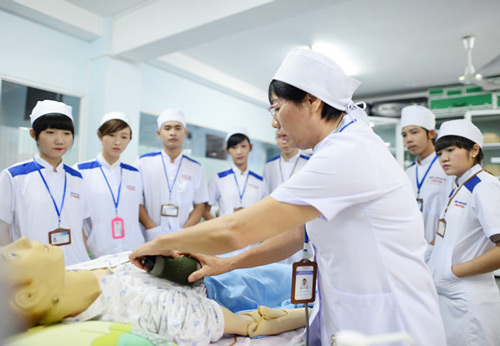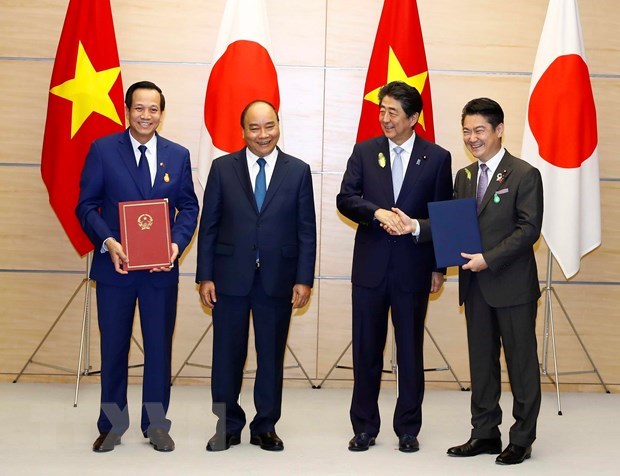Vietnam, Japan sign MoC on specific skilled workers
 |
To cope with the issue, the Japanese government has amended the ‘Immigration Control Act’ and took comprehensive measures for the acceptance of foreign workers, with specific expertise and skills, residing in Japan.
The Japan government has introduced a new ‘Status of Residence’ for specific skilled workers, which is effective from April 1.
Vietnam’s Ministry of Labour, Invalids and Social Affairs (MOLISA) and four Japanese agencies on July 1 signed a memorandum of cooperation (MoC) on cooperation in building a basic legal framework to implement the specific labour skills training programme.
Prime Minister Nguyen Xuan Phuc and his Japanese counterpart Shinzo Abe attended the signing ceremony of the MoC, inked by representatives of the MOLISA and the Ministry of Justice, Ministry of Foreign Affairs, Ministry of Health, Labour and Welfare, and the National Police Agency of Japan.
The MoC is a fundamental legal framework for Japan to receive Vietnamese workers under Japan’s “specific skilled workers” programme.
 |
At the signing ceremony. Photo: VNA
Under the deal, the Japanese side will only accept specific skilled workers from Vietnam after they complete necessary procedures in line with the law of Vietnam, which enables them to enter a recognised list of the MOLISA.
The workers must be sent from organisations and businesses licenced by the MOLISA, along with Vietnamese nationals residing in Japan who are directly recruited by Japanese employers.
The MoC bans unqualified Vietnamese residing in Japan to take part in skill testing activities in Japan.
The Japanese side will apply suitable measures to prevent Vietnamese guest students to change their residential status to work in Japan, said the MoC.
Under the deal, specific skilled workers in Japan will enjoy benefits in line with the country’s immigration law, labour law and other related regulations. At the same time, they will have other rights related to Japanese and other skills training fees, travel allowance, including air tickets to Vietnam after ending the contract.
Japan will not receive Vietnamese workers in banned regions or sectors, it said.
Through the MoC, Vietnam and Japan agreed to share information of agencies and organisations authorised for sending or receiving workers to work in Japan, while coordinating with each other in management and supervision activities to prevent violations.
On the same day, PM Phuc and PM Abe witnessed the signing of another five documents, including the agreement on the transfer of sentenced persons; and the diplomatic note between the two governments on providing non-refundable aid packages for the Japanese Grant Aid for Human Resource Development Scholarship (JDS).
Vietnam’s Ministry of Health and Japan’s Office of Healthcare Policy under the Cabinet Secretariat, Ministry of Health, Labour and Welfare, Ministry of Economy, Trade and Industry also signed a MoU on cooperation.
The MoLISA and the National Institute of Technology KOSEN inked a MoU to continue with cooperation activities to implement the KOSEN training models in Vietnam.
The two government leaders also witnessed the exchange of a contract for renewable energy projects between the Joint Stock Commercial Bank for Foreign Trade of Vietnam (Vietcombank) and the Japan Bank for International Cooperation (JBIC).
Over the next five years, two Specified Skills Visas will allow about 345,000 foreign workers into the country over the next five years, in 14 industries, as part of an effort to alleviate severe labor shortages.
VNF
Recommended
 National
National
Vietnam News Today (Jun. 4): Vietnam - Promising Candidate for Southeast Asia’s Next Powerhouse
 National
National
Shangri-La Dialogue 22: Vietnam Highlights Some Issues of Ensuring Stability in a Competitive World
 National
National
Vietnam News Today (Jun. 3): PM Pham Minh Chinh to Attend UN Ocean Conference, Visit Estonia, Sweden
 National
National
Vietnam News Today (Jun. 2): Vietnamese Trade Mission Sounds Out Business Opportunities in United States
 National
National
Vietnam News Today (Jun. 1): Vietnamese, Japanese Firms Foster Partnership
 National
National
Vietnam News Today (May 31): Vietnam Strongly Supports Laos’s National Development
 National
National
Vietnam News Today (May 30): Vietnam, Venezuela Reinforce Ties Through People-to-people Diplomacy
 National
National
